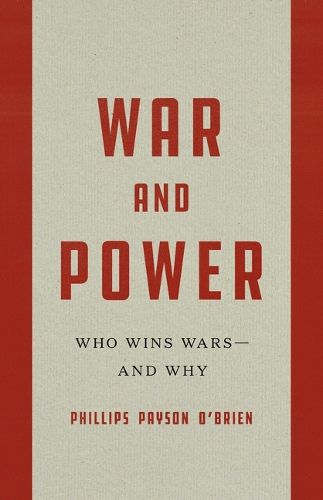Readings Newsletter
Become a Readings Member to make your shopping experience even easier.
Sign in or sign up for free!
You’re not far away from qualifying for FREE standard shipping within Australia
You’ve qualified for FREE standard shipping within Australia
The cart is loading…






A bold, revisionist study of modern warfare, showing that military victory is rooted not in large armies and decisive battles, but in the full spectrum of economic, political, and social power "Vital reading for anyone grappling with America's uncertain place in today's global order." --Alexander Vindman, New York Times-bestselling author of The Folly of Realism
For nearly two centuries, international relations have been premised on the idea of the "Great Powers." As the thinking went, these mighty states--the European empires of the nineteenth century, the United States and the USSR during the Cold War--were uniquely able to exert their influence on the world stage because of their overwhelming military capabilities. But as military historian Phillips Payson O'Brien argues in War and Power, this conception of power fails to capture the more complicated truth about how wars are fought and won.
Our focus on the importance of large, well-equipped armies and conclusive battles has obscured the foundational forces that underlie military victories and the actual mechanics of successful warfare. O'Brien suggests a new framework of "full-spectrum powers," taking into account all of the diverse factors that make a state strong--from economic and technological might, to political stability, to the complex logistics needed to maintain forces in the field.
Drawing on examples ranging from Napoleon's France to today's ascendant China, War and Power offers a critical new understanding of what makes a power truly great. It is vital reading in today's perilous world.
$9.00 standard shipping within Australia
FREE standard shipping within Australia for orders over $100.00
Express & International shipping calculated at checkout
Stock availability can be subject to change without notice. We recommend calling the shop or contacting our online team to check availability of low stock items. Please see our Shopping Online page for more details.
A bold, revisionist study of modern warfare, showing that military victory is rooted not in large armies and decisive battles, but in the full spectrum of economic, political, and social power "Vital reading for anyone grappling with America's uncertain place in today's global order." --Alexander Vindman, New York Times-bestselling author of The Folly of Realism
For nearly two centuries, international relations have been premised on the idea of the "Great Powers." As the thinking went, these mighty states--the European empires of the nineteenth century, the United States and the USSR during the Cold War--were uniquely able to exert their influence on the world stage because of their overwhelming military capabilities. But as military historian Phillips Payson O'Brien argues in War and Power, this conception of power fails to capture the more complicated truth about how wars are fought and won.
Our focus on the importance of large, well-equipped armies and conclusive battles has obscured the foundational forces that underlie military victories and the actual mechanics of successful warfare. O'Brien suggests a new framework of "full-spectrum powers," taking into account all of the diverse factors that make a state strong--from economic and technological might, to political stability, to the complex logistics needed to maintain forces in the field.
Drawing on examples ranging from Napoleon's France to today's ascendant China, War and Power offers a critical new understanding of what makes a power truly great. It is vital reading in today's perilous world.